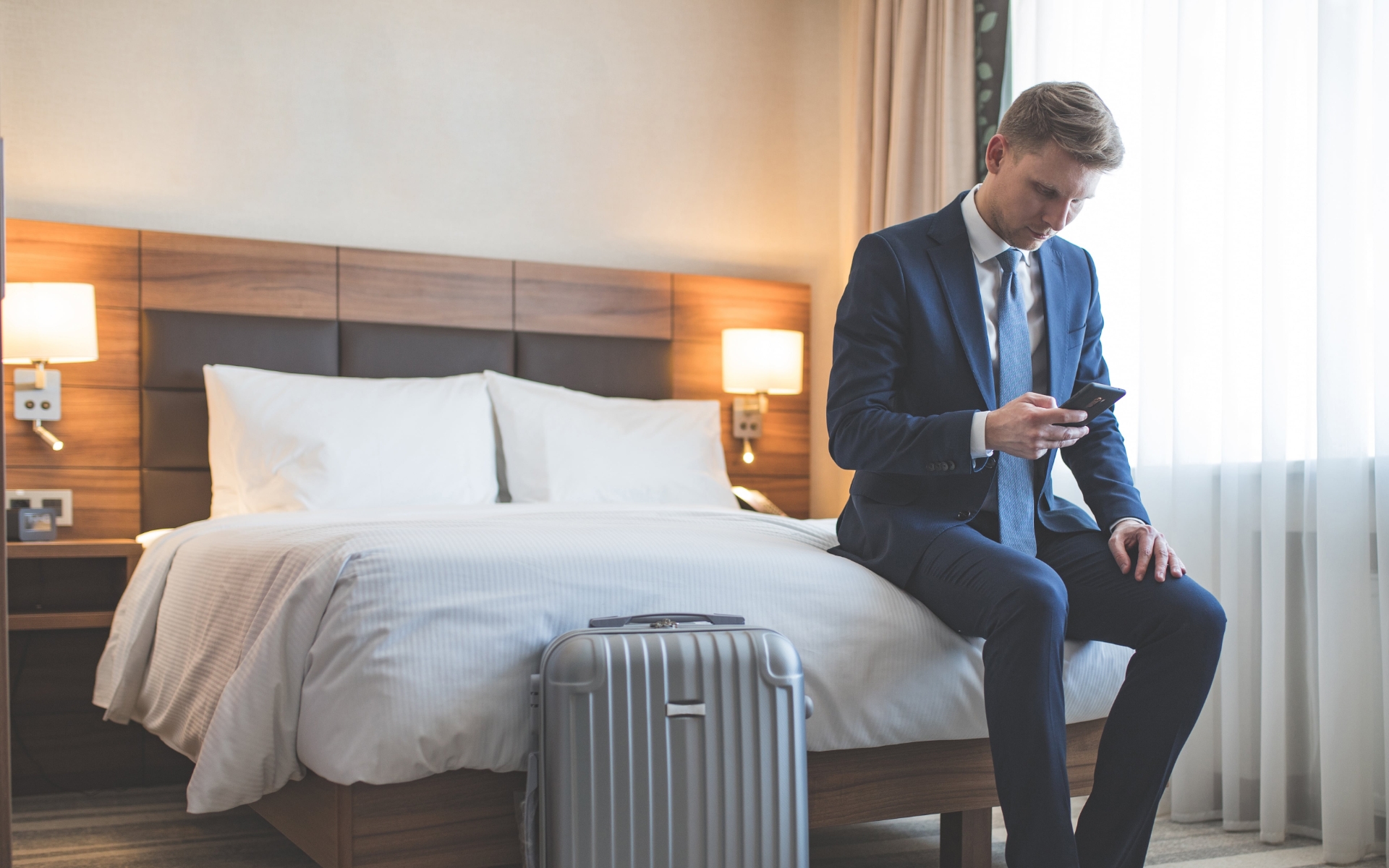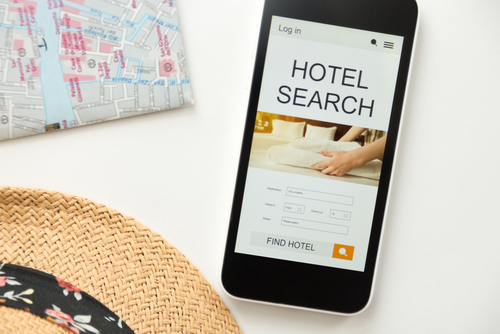
Travel Coordination via Smart-Phone Occurring in Record numbers…Its Only Just Begun
I used to book hotel and airfare via a live travel agent…remember those? Next, the internet via my desktop was the preferred choice. Now, more
The hospitality market is in the midst of a massive transformation in technology, operations, and guest engagement. But will ‘high-tech’ advancements always conflict with ‘high-touch’ hospitality?
—Michael Heflin, Chief Revenue Officer at Stayntouch
An often-overlooked question in the hospitality industry is what, exactly, does a hotelier sell? In the early days of the hospitality industry, hoteliers primarily sold refuge: a simple bed and a bar. But in many ways, it was much more than that. Hotels provided safety, security, warmth 一 and hopefully some kindness 一 in the midst of journeys that could often be lengthy and complicated.
In the 20th century, revolutions in air and automotive travel promoted significant changes to the hotel industry as well. While many hotels still cater to road-weary salespeople or stressed family vacationers, the unique demands of modern travelers have redefined the business models and physical designs of modern hotels. From boutique hideaways to vacation rentals, mega-resorts to luxury camping, the picture of a “hotel” has evolved significantly in the last 50 years.
The rise of online travel agencies (OTAs) in the 1990s greatly streamlined the booking process for customers, but with the unintended consequence of dehumanizing hospitality and service. The concept of immersive, ‘high-touch’ hospitality that affected all five senses was compressed into a few pictures and a short description. A once vibrant guest journey was oversimplified to fit into room categories and star ratings, forcing customers to make decisions based on a few pictures of the property and the room’s rate.
Last week, Stayntouch partnered with NYU Tisch Center of Hospitality Graduates to release the 2022 Hotelier Technology Sentiment Report, which surveyed more than 500 hoteliers from around the world to determine their thoughts on the impact that emerging technology would have on the hospitality industry. The results indicated that the hospitality market is in the midst of a massive transformation in technology, operations, and guest engagement.
The study also shed light on a legitimate concern the industry has only just begun tackling – is the hotel experience a zero-sum tradeoff between technology-enabled operating efficiency and the humanity-driven essence of true hospitality? Are ‘high-tech’ advancements always in conflict with ‘high-touch’ hospitality?
One of the things that makes hospitality so unique is how the relationship between technology, process, and people varies from one corner of the hospitality industry to the other. Some of the world’s most unique and exceptional hotels build their guest experiences on a series of engaging, ‘high-touch’ interactions between staff and guests, with little more than the necessary underlying technology. Other brands are more ‘tech-forward’, relying less on human interactions, and more on applying emerging technologies such as contactless check-in, AI, and the Internet-of-Things (IoT) to deliver their unique vision of hospitality.
The question facing us today is how will the equation evolve as consumers start to demand both high technology and more humanized service? Is it even possible to ‘square-the-circle’ and meet this new demand? More specifically, how can hotels provide a high-tech experience, while also avoiding the one-size-fits-all dehumanization that befell legacy OTAs?
The implicit conclusion from the 2022 Hotelier Technology Sentiment Report, is that not only can advanced technology and humanity co-exist, but they are dependent on one another for success. In fact, the hospitality industry is racing towards a new product revolution where the efficiency of advanced distribution will merge with the creativity of leading hoteliers to form a new guest experience that will be warm, engaging, and hyper-personalized.
No longer will a consumer purchase a room based on a few pictures and a room description. Tomorrow consumers will define the exact guest experience they’re looking for, from welcome to departure. Guests will be able to define the exact features, amenities, and experiences they want to create their perfect stay. Tired business travelers will be able to choose a contactless mobile check-in, which will allow them to go directly to their room where a cold beer and hot shower are already prepared and waiting. Conversely, large families can opt for a larger room and a ‘high-touch’ welcome experience. Here, a friendly concierge can personally help them check into a suite with room for both teenagers and infants, take care of any special requests (such as cribs or bike trailers), and help them plan family-friendly activities for the weekend.
While many hoteliers previously wondered if advances in modern technology come at the expense of genuine human service, tomorrow’s mobile technology will be more fluid, intuitive, and organically responsive. This is the exact opposite of a zero-sum game 一 this is a game where high technology and human service complement and reinforce each other. Where staff, unburdened by repetitive administrative tasks and unshackled by the granite front desk, are free to meet guests anywhere on property and once again become as much a part of the experience of hospitality as the physical space itself.
But in order to truly merge technology and service to fully unburden hospitality, hoteliers need to define the philosophy of service underlying their brand identity 一 and then identify a technology partner capable of amplifying that identity. With advanced automation, improved connectivity, more collaborative communication, and more guest control, we believe in a future where technology can enable a hotelier’s unique vision of the ideal guest experience.
Mobile and cloud technology is facilitating an entire catalog of new and expressive hospitality concepts, and is literally redefining the relationships between the hotel and its guests:
The TWA Hotel has leveraged day-use and hourly bookings to cater to airport travelers facing flight delays or extended layovers. Now, instead of booking a room for the entire night (or just ‘crashing’ in the terminal), travelers can book rooms in four-hour increments, delivering the privacy they need to rest, catch up on work, or freshen up before a meeting.
Mint House at 70 Pine is utilizing day-use bookings to attract the growing segment of remote and virtual workers. While remote work can be convenient, it can also be monotonous and distracting. At Mint House, teleworkers are able to rent a quiet hotel room with access to modern office equipment to telework, cowork, or host private in-person meetings.
Zoku Amsterdam has taken full advantage of mobile contactless check-in. Instead of forcing travelers to check-in at a front desk, Zoku guests can check in through their smartphones, a sleek guest-facing kiosk, or through a friendly hotelier aided by a tablet. An unexpected result was that they completely transformed the concept of the lobby 一 turning it from a glorified waiting room, to a guest-centric space for dining, socializing, and co-working.
Under Canvas has taken the concept of contactless check-in to an entirely new level. As a modern glamping hotel, they not only use mobile check-in to get rid of the front desk 一 they’ve gotten rid of the entire lobby. With Under Canvas, guests can stay in luxurious suites housed in canvas tents, and literally check-in under the stars!
The best technology will amplify the humanity of hospitality and create a new level and consistency of service, uniquely responsive to the individual needs of staff and guests alike. And with the technology to power, deliver, and bring humanity back into hospitality, we can’t wait to be a part of what they come up with next.

I used to book hotel and airfare via a live travel agent…remember those? Next, the internet via my desktop was the preferred choice. Now, more

We love our mobiles. As of today, GSMA’s real-time tracker puts the number of mobile devices at around 8 billion! And smartphones are leading the

Apple has not only made a huge splash in the mobile payment sector with the introduction of Apple Pay, they might have revitalized the entire NFC (Near


See how StayNtouch’s Cloud PMS, Guest Mobility, and Guest Kiosk solutions deliver better results for hotels through better front & back of house communication, increased mobile touch-points, more revenue and operational efficiency, and unlimited interfaces.
Your demo will include how to:

Manage and Set Tasks Across Your Departments

Ensure Guest Satisfaction & Safety With Contactless Check-in Options

Automate Easy Upsells & Monetized Early/Late Checkouts

Set & Manage Rates/Availability

Integrate With Tools and Platforms Essential
to Your Hotel
And More!